Last chance to register for LDA’s David Kilpatrick seminars
5 Replies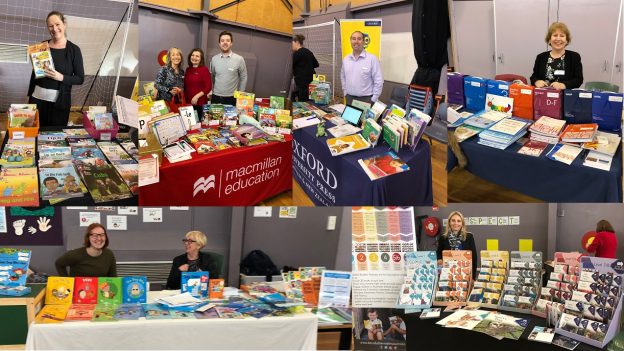
Registrations close shortly for this month’s LDA seminars by David Kilpatrick. I’m not sure exactly when they close for Perth and Cairns, but Melbourne’s close on 8th August. Adelaide & Sydney are already sold out. The seminar on the 19th at Melbourne Town Hall will include 17 supplier displays (details below) to browse from 8.15-9.00am and during the breaks.
Dr Kilpatrick is the author of the excellent Essentials of Assessing, Preventing and Overcoming Reading Difficulties and Equipped for Reading Success, and you might have also seen him talk online (e.g. here, here, here, here and here).
I recently assessed a teenager with the kind of reading and spelling difficulties I hope these seminars will soon help stamp out. He’s a classic Compensator. Intelligent, hard-working, with good oral language skills, but very poor phonemic awareness and proficiency (<1st percentile on the CTOPP-2 Elision subtest) and thus weak word-level reading and spelling.
He finds it hard to sound out unfamiliar words, tending to look at the start and end of words and guess the middles. If you give him a wordlist including similar-looking words like “complete” and “compete”, he probably won’t notice they’re different.
His teachers aren’t aware of the extent of his reading difficulties because they don’t test word-level reading or phonemic awareness, and when this student reads connected text he gets most of the words right, by compensating for his poor decoding with his good oral language. They notice his poor spelling, and try to help him with it, but it’s not really their area of expertise. (more…)
Ros Neilson on the Foundations of Early Literacy Assessment (FELA)
2 Replies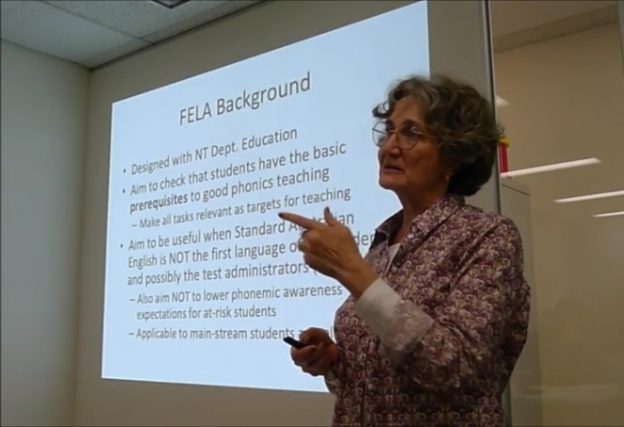
Last month at our office we had the pleasure of hosting Speech Pathology legend Roslyn Neilson for a talk about her newish early literacy assessment, the FELA.
The FELA is intended to supersede two of Ros’s previous tests, the SPAT-R and SEAPART, and help teachers, therapists and others assess phonemic awareness and alphabetic knowledge, which are vital, teachable early literacy skills.
The FELA can be used in preschool screening as well as progress monitoring through the early years of primary school.
On the day, we decided to video the session, as we could only fit 30 people into our biggest room (which Ros scarily called a Conference Centre), and had to turn a few people away, plus many other interested people were too far off or too busy to come.
Here’s the video, with my apologies that it’s blurry at the start and there is a short break and you might need to turn up the volume towards the end (camera malfunction). Ros’s slides can be downloaded here.
Thanks so much to Ros for freely sharing her time and expertise so generously, and for the chocolates, which we are still enjoying. The FELA is available from Ros’s website, takes up to 30 minutes per child and I think is very reasonably priced at $198 inc GST. If you’d like to take a look at it and you’re in Melbourne, Ros has left us a copy, and you’d be welcome to browse it.
Thanks also to fab Spelfabet staff Renee Vlahos, Caitlin Stephenson and Tessa Weadman (yes, I am going to put them on the website soon) for their help, and to my brother for the huge bag of apples that got me making easy, delicious apple cake (here’s the recipe, but I microwaved and drained the apples, and beat the eggs). After I bought my Goodwill Wine I found out they raise funds for Code Read Dyslexia Network. Please consider when next ordering wine.
My brother just gave me ANOTHER huge bag of apples, so maybe that means I should invite another speaker. Ros is a pretty hard act to follow, but let me know if you have ideas/suggestions.
Running Records are an uninformative waste of teacher time
31 Replies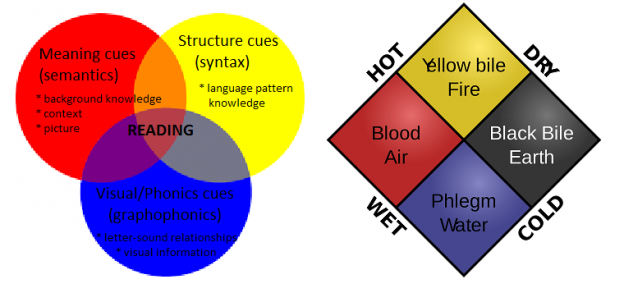
I’ve been doing lots of assessment of my clients’ skills in the following areas lately:
- Receptive and/or expressive language
- Articulation
- Phonological awareness
- Phonological/auditory memory
- Rapid Automatised Naming
- Word and pseudoword reading accuracy and efficiency
- Spelling.
These allow me to identify problems in their reading and spelling systems, and work out how significant/severe these problems are, and what to do about them.
I use the robust, evidence-based Simple View of Reading (SVR) to guide my decision-making.
Wherever possible, I use valid, reliable, standardised tests for assessment. However, I once administered a Running Record to a child with selective mutism, because she would talk to me, but not other adults at school (we were working on it). Her class teacher thus asked me to administer the assessment required by the school, which (sad face) used a multi-cueing model of reading and a text level gradient approach to reading assessment. (more…)
The nature of reading development and difficulties
12 Replies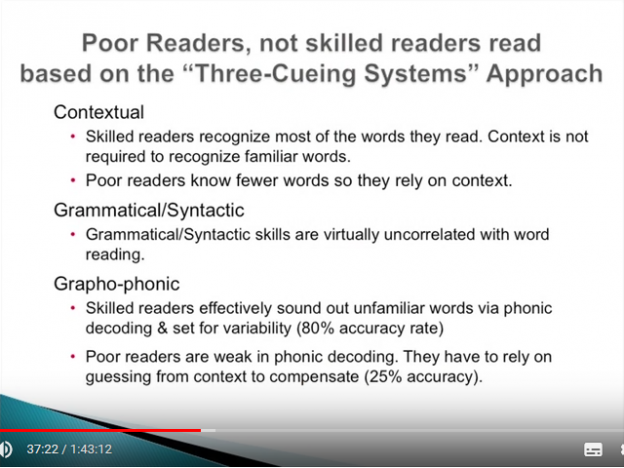
Last day of the school holidays. Time to summarise David Kilpatrick’s third excellent seminar, “The Nature of Reading Development and Reading Difficulties”, presented at the 2017 Reading in the Rockies conference.
Here it is on Youtube, if you just want to cut to the chase:
Numbers in brackets refer to the time on the video clock, to help you find sections of particular interest.
(2:14) Tens of millions of dollars are spent on reading research, and the findings go into journals, never to be heard of again, unless you’re a reading researcher.
Working as both a school psychologist and a university lecturer gave Dr Kilpatrick access to these journals, and made him think about their practical application to kids sitting across the table from him in schools. (more…)
Low frequency word spelling test
9 Replies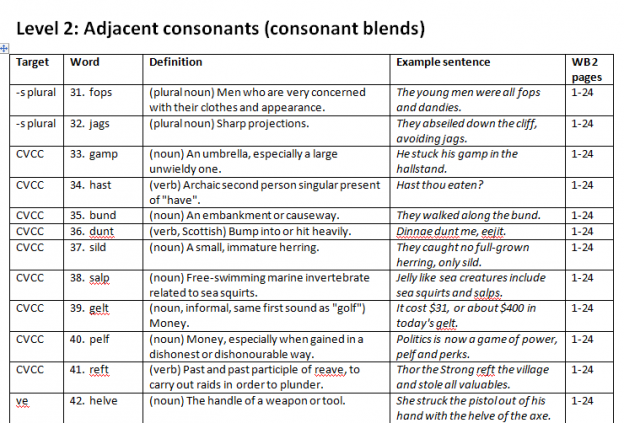
I’ve just made up a free, low-frequency word spelling test which you can download here and use to explore learners’ spelling skills and knowledge.
It’s not a standardised test, so won’t tell you whether a learner’s spelling skills are behind, on a par with or ahead of peers. Its purpose is to focus your attention on the things that matter most for spelling:
- speech sounds (phonemes),
- letter patterns that represent these sounds (graphemes),
- word structure (positions and combinations of sounds in words/syllables),
- parts of speech e.g. “pact” is a noun, “packed” is a verb,
- meaning (especially for homophones like see/sea),
- meaningful word parts (morphemes such as prefixes, suffixes and word stems/roots).
This should help you work out which key skills and knowledge learners already have, and which they need to learn, and thus help teach them to spell explicitly, systematically and effectively.
Don’t do the whole test with anyone, it’s far too long (390 items). Start at your learner’s estimated current skill level, and work forwards if they get words mostly correct, and backwards if they don’t. Stop when you hit a floor (most words too easy) or ceiling (most words too hard). (more…)
PIRLS 2016 results
5 Replies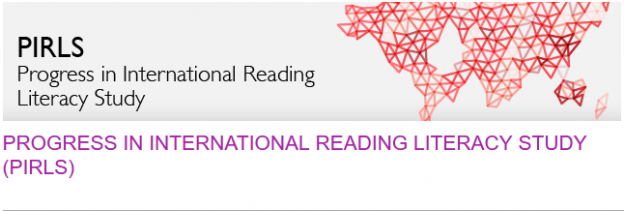
The 2016 Progress in International Reading Literacy Study (PIRLS) results came out yesterday. They show that Australian Year 4 kids are better at reading than they were in 2011. Excellent.
However, only 81% reached the “proficient” benchmark, and about 7% of kids are still reading very poorly*, a number unchanged since 2011. Far too many of them are indigenous.
What did PIRLS 2016 involve?
One Year 4 class plus all indigenous Year 4 students in 286 schools (6341 kids in total) across the country took part. The school sample was selected to represent all states and territories as well as Australia’s geographic, school sector and socioeconomic diversity. (more…)
Alternative facts about phonics
14 Replies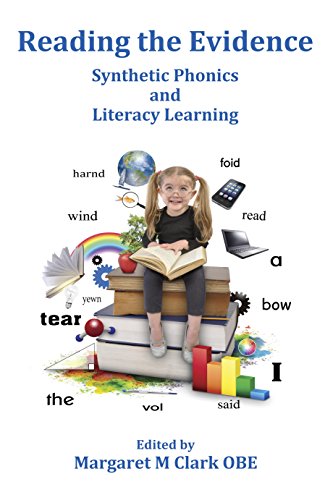
I’ve just read a new e-book called Reading the Evidence: Synthetic Phonics and Literacy Learning, edited by Margaret M Clark OBE, a UK Visiting and Emeritus Professor who the About The Editor section says “has undertaken research on a wide range of topics and has developed innovate (sic) courses”.
Its announcement elicited some e-eye-rolling from members of the Developmental Disorders of Language and Literacy Network, and jovial suggestions that others buy, read and comment on it, but apparently I’m the only one with nothing more important to do (sigh).
Also on my reading list at the moment is The Influential Mind, about how to persuade people in the face of Confirmation Bias, our tendency to ignore or dismiss evidence that’s not consistent with what we already believe. Confirmation Bias is why presenting scientific data to the climate sceptic in your life never works. You can watch a video about it here.
Reading the Clark et al e-book thus also became an interesting exercise in thinking about my own thoughts. I’d set aside time to read the book in order to write what I hoped would be a thoughtful, informed response, but my brain kept coming up with other ideas. Did it keep switching off because of my own confirmation bias, or because of the standard of what I was reading? (more…)


